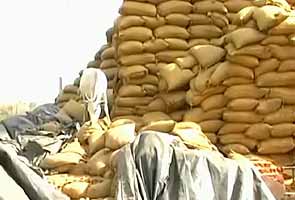
The Cabinet will today discuss and clear an ordinance that makes the Congress-led UPA government's ambitious Food Security Bill a law. But many feel that its implementation is not going to be easy.
Here's your 10-point cheat-sheet on the Food Security Bill:
Critics say at a time when India's economy is growing at its slowest pace in a decade, the Rs 1.23 lakh crore populist scheme will simply add to the fiscal nightmare.
India's food subsidies account for nearly 40 per cent of overall subsidy costs and that bill is expected to soar to more than 50 per cent once operationalised.
Some activists feel that the bill may not be an instant solution to the problem of malnourishment, as its benefits will not reach those who are in need. "If we leave any room for corruption in the bill, it will lead to its non-implementation, and will also in a sense make entitlements to not reach the poor people. And hunger and malnutrition will continue to be in place," said Sachin Jain, an activist.
Currently, 61 million children in India suffer from malnourishment, statistics that's worse than some of the poorest countries like Bangladesh or regions like Sub-Saharan Africa. The Food Security Bill, which is championed by Congress president Sonia Gandhi, promises wheat at Rs 2 per kilo and rice at Rs 3 to nearly 70 per cent of India's population.
Many families think that the scheme could literally be a life-saver for them. "I am not able to provide proper food to my children. There is only one member of family working in the mines, how can we afford nutritional food?" says Saroj, a villager in Madhya Pradesh. Her husband Vikash earns just Rs 1,000 per month as a mine worker. His meagre salary is just not enough to feed the family of five.
The malnourishment situation is acute in the country but despite that, the government has decided to triple its wheat exports this year to a record six million tonnes. The Centre has also moved to procure an additional 53 million tonnes of foodgrain, but the decision will stretch the existing storage capacity, resulting in overflowing godowns, something the activists feel is criminal.
The passage of the bill also faces some political hurdles. The Opposition, led by the BJP, has opposed the ordinance route to the food security bill. The BJP has said it wants a debate in Parliament on the proposal.
More than the Opposition, the Samajwadi Party (SP), whose support is crucial to the stability of UPA, is strongly opposed to the bill. SP chief Mulayam Singh Yadav has openly opposed the bill as "anti-farmer". The Left too had attacked the government for trying to force the scheme without an adequate discussion in Parliament about logistics or its impact on farmers.
The government has abandoned any plans it may have had to get it passed in Parliament based largely, sources say, on suggestions from the Election Commission that state elections will be announced by September 22. That gives the ruling coalition a narrow window to push through as an ordinance using its special constitutional powers.
The ordinance must be cleared by Parliament within six weeks of its next seating; sources say this may provoke the government to delay the Monsoon Session.

